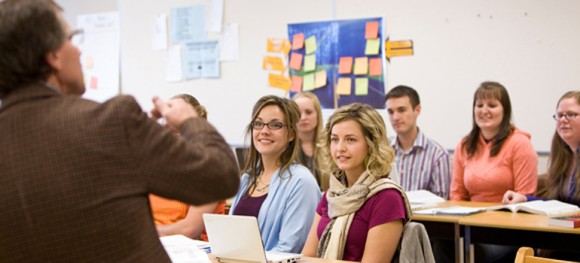
With mindfulness in mind, smartUBC is developing new programs and services for educators and community, industry, and academic partners.
Stress Management and Resiliency Techniques become part of curriculum
As the New Year approaches, many people take time to make resolutions. At UBC Okanagan, mindfulness has not only become a resolution, but a fast-growing movement to improve education—in and outside the classroom.
Promoting Stress Management and Resiliency Techniques (known as SMART), smartUBC is a program originally developed in the United States intended to help educators. Evidence-based research proves that mindfulness programs create better educators. UBC Okanagan’s Faculty of Education has developed a 20-hour workshop-style smartEducation course, but Annette LaGrange, chair of the faculty’s curriculum committee, says mindfulness goes well beyond the classroom.
“The scientific evidence developed in the last 20 years is clear,” says LaGrange. “We can change our brains and by doing so we can become more mindful, more able to respond effectively and with less stress. We now know how the brain changes and what processes we can use to change our minds so that we can be happier, healthier and able to respond to others in ways that are kind and compassionate.”
Idea is catching on
While first adopted for educators, other UBC faculties quickly took note. LaGrange, who helps manage the implementation of the academic components of the program, says only positive growth can come from the adoption of the smartUBC mindset. And it goes well beyond the classroom. Indeed, LaGrange says being mindful is a skill needed for day-to-day living in our busy and stressed society.
“We can be more attentive in the present moment and respond more appropriately in stressful situations. This is a very valuable skill especially for professionals who work directly with people in demanding situations.”
What exactly is mindfulness? Bonny Thorne, manager of smartUBC, says the UBC program builds on mindfulness-based stress reduction (MBSR) techniques and personal awareness tools. smartUBC is also developing new programs and services in collaboration with community, industry, and academic partners.
During the smartEducation course, for example, educators learn:
- stress management techniques
- how to control emotions
- self-care skills to cultivate personal and professional resilience
- enhanced concentration and decision-making skills
- methods to improve overall mental and physical health
The idea is to improve and promote personal happiness through healthy habits of the mind through experiential practices that promote:
- concentration, attention, and mindfulness
- awareness and understanding of emotions
- empathy, compassion
- positive interpersonal communication
These skills help educators promote a positive learning environment, as well as enabling them to support mindfulness programs for students.
The movement is growing across UBC’s Okanagan campus. The School of Social Work is currently exploring the use of evidence-based mindfulness practices in the training of clinical social workers in the Master of Social Work program. And the School of Nursing (SON) will officially implement mindfulness into its curriculum starting September 2015.
SON Associate Director Sheila Epp says Nursing has a course stream called relational practice—essential for learning about self and building the ability to be with residents, patients, and clients in multiple life and health situations—but Epp knew there was room for more.
“We wanted to explore the notion of working with smartEducation to increase and possibly infuse mindfulness-based stress reduction and mindfulness within the Nursing program,” says Epp. “It was a perfect fit for our relational practice curriculum and was what we were looking for in terms of evidence-informed practices.”
Mindfulness at home, school, or work
Mindfulness, Epp says, can begin at home without training and she suggests basic ideas like pausing when a situation arises, taking a deep breath, thinking and then responding. Mindful-based stress reduction courses are often available, and at the very least, a yoga or meditation session may help bring some calm into a frantic work day.
For the working professional, especially those in stressful careers like education, social work, and nursing, mindfulness training just make sense, she adds.
“Research shows that engaging in mindfulness leads to improved ability to practice to a higher standard,” says Epp. “We will want to see this infused in patient care as well—research shows that patients and clients can benefit from meditation and relaxation skills as part of their care.”
As exams come to a close at campus, LaGrange encourages everybody to try a little mindfulness.
“Finding time in our lives to be present in the moment is often very hard especially at this time of the year,” she says. “We have been taught that to multi task is the way to achieve more, yet brain science is telling us that this is stressful and does not make for the best decisions. Perhaps in the holidays we can decide to do less, buy less, and spend more time enjoying families and friends doing simple things together like going for a walk in nature.”
She suggests finding time to spend time alone and using that time to check in with yourself, your feelings, your sensations, your thoughts. Make it a gift to yourself at this mindful time of year.
—30—
More Campus Life articles
 Police watchdog called in
Police watchdog called in Mayor calls 'BS' on list
Mayor calls 'BS' on list U.S. authorities find bodies
U.S. authorities find bodies Premier stands by pick
Premier stands by pick Canada's most-wanted list
Canada's most-wanted list Sask. will still get rebates
Sask. will still get rebates Santos ends comeback bid
Santos ends comeback bid Douglas C-54 plane crashes
Douglas C-54 plane crashes Trump's 'eyes and ears'
Trump's 'eyes and ears' US TikTok ban sent to Biden
US TikTok ban sent to Biden Phish fans enter the Sphere
Phish fans enter the Sphere CN Rail profits fall
CN Rail profits fall  Warriors snakebitten in loss
Warriors snakebitten in loss Iginla off to Europe
Iginla off to Europe Rockets ink prospect
Rockets ink prospect Alleged Tupac killer in court
Alleged Tupac killer in court Lawsuit accuses Megan
Lawsuit accuses Megan Bam Margera’s tour axed
Bam Margera’s tour axed


